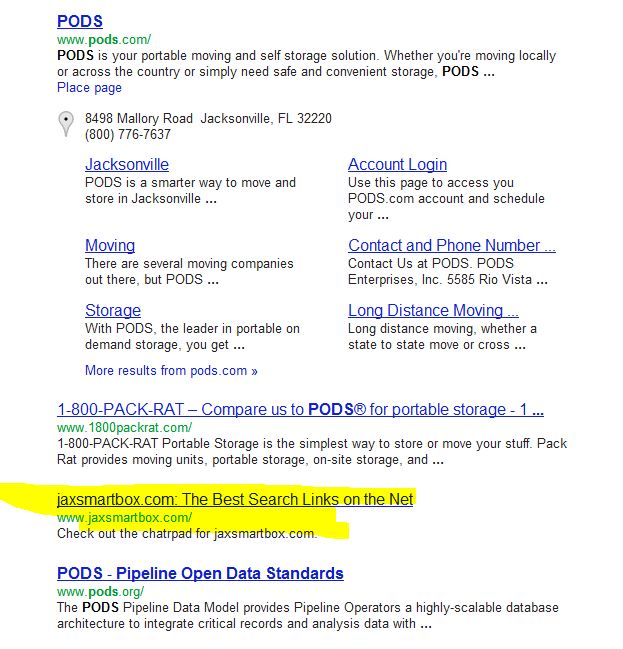Google has released a new update and this time its called Penguin. The days of Panda are over and SEO’s all over the world are very unhappy. Penguin seems to have gone too far making search results less relevant than ever. Goolge says these updates are aimed at cleaning up the spammy results from the search engines.
A quick search for the terms “pods” shows these results.

So can it possible get more spammy than that. A click on that link shows this website.

How is this site possibly worth ranking #3 on a competitive term like pods.
Obviously they are pulling in same local info from our location in Jacksonville, FL, but how can that site even rank after all of these Panda updates focusing on quality content and better links. The answer, it didn’t. That site did not show up until Penguin.
So from what I see, the Pengiun update is a failure. It has placed junk sites ahead of relevant results – having the exact opposite effect of what they said it was supposed to do.
What can we do about it? Nobody knows at this point. All I know is there are over 500 complaints on Google’s own blog.
http://googlewebmastercentral.blogspot.com/2012/04/another-step-to-reward-high-quality.html
I will keep you all posted as more developments with Penguin come out in the future.
Removing “Allowed Tags” on the comment form.
This solution is from the wordpress forums from Emsi. It is not guaranteed to work on all themes, but it did work fine for me on my theme based on twenty ten. Follows these steps: 1. back up your functions.php file. 2. Add the following to your functions.php file function my_comment_form_args($user_identity, $post_id, $req) { $args…
How to remove the website field from the comment form
I had a customer request to remove the website field in the comments. You would think this would be a relatively simple thing to do, but not so. After an hour of searching, I found a solution that worked great. Here is the link. http://techhacking.com/2011/02/04/wordpress-how-to-remove-the-website-field-from-the-comment-form/
Google Website Optimizer and WordPress
Today I started a test using Google Website Optimizer on WordPress. The manual way of doing this would mean you would need to create 3 different headers and input the correct tracking code in each. While it is not a ton of work, it is a pain in the butt. The better way to do…
